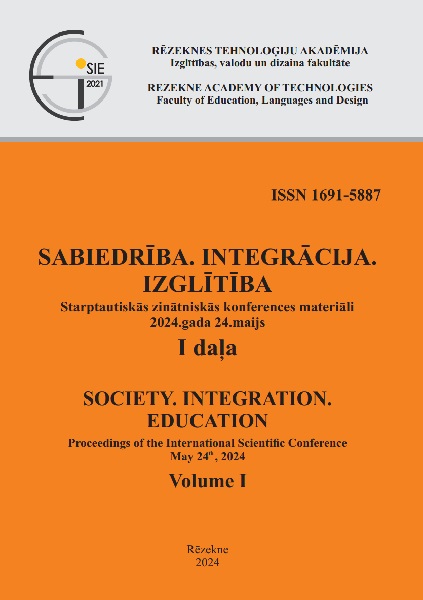EARLY SCHOOL LEAVING RISKS RELATED TO EDUCATIONAL INSTITUTION
DOI:
https://doi.org/10.17770/sie2024vol1.7906Keywords:
early school leavers, school environment, preventionAbstract
Some of the main challenges in contemporary education systems are decrease of students learning motivation, students, who don’t engage in academic work and early school leaving.
In Latvia the percentage of early school leavers still remains high. Main factors reported as the reason for early school leaving were not only risks related to students personality traits, family or social environment, but also risks related to school environment, diverging comprehension of the problems related to at-risk youth among teachers and school staff and different approaches within each school to prevent early school leaving.
The method used in the research was questionnaires (with closed and open questions). 195 teachers from comprehensive schools (all districts) in Latvia were involved.
The main goal of the research is to analyze teachers comprehension and assessment on early school leaving risks related to school environment and to analyze teachers views about possibilities to identify at-risk youth at an early stage.
Another goal of the research is to create a sustainable action plan, to reduce early school leaving risks related to school environment
References
Bondare, K., & Martinsone, B. (2017). Sākumskolas skolēnu piederības izjūta skolai, vecāku iesaistīšanās bērna izglītībā un skolotāja–vecāku savstarpējā uzticēšanās. Baltic Journal of Psychology, 18 (1, 2), 76.–90.p
Cefai, C., Simoes, C., & Caravita, S. (2021). A systemic, whole-school approach to mental health and well- being in schools in the EU. NESET report, Luxembourg: Publications Office of the European Union. https://nesetweb.eu/wp-content/uploads/2021/09/NESET-AR2-2021_executive-summary_EN.pdf
Eiropas Savienības Oficiālais Vēstnesis. (2022). “Ceļi uz panākumiem skolā” un ar ko aizstāj Padomes 2011. gada 28. jūnija Ieteikumu par politiku, lai mazinātu mācību priekšlaicīgu pārtraukšanu. Pieejams: https://eur-lex.europa.eu/legal-content/LV/TXT/?uri=CELEX%3A32022H1209%2801%29&qid=1707055427262
Eiropas Speciālās un iekļaujošās izglītības aģentūra. (2017). Priekšlaicīga izglītības pamešana un izglītojamie ar funkcionāliem traucējumiem un/vai speciālām izglītības vajadzībām. Galīgais kopsavilkuma ziņojums. (G. Squires, red.).Odense, Dānija. Pieejams: https://www.european-agency.org/sites/default/files/esl-summary-lv.pdf
Elksne, G., & Rubene, Z. (2018). Emotional Well-Being im Schools. Pieejams: https://www.researchgate.net/publication/325368928_EMOTIONAL_WELL-BEING_IN_SCHOOLS
Eurostat. (2024). Early leavers from education and training, age group 18-24. Pieejams: https://ec.europa.eu/eurostat/databrowser/view/tesem020/default/table?lang=en
Geske, A. & Grīnfelds, A. (2020). Izglītības pētījumu aptaujas- no izveidošanas līdz datu apstrādei. Rīga: LU Akadēmiskais apgāds. Pieejams: https://dspace.lu.lv/dspace/bitstream/handle/7/54441/PPMF-18_Geske-Grinfelds_001-168_GATAVS.pdf?sequence=1&isAllowed=y
Hickman, G. P.,& Heinrich, R. S. (2011). Do Children Drop Out of School in Kindergarten? A Reflective, Systems-Based Approach for Promoting Deep Change. Publisher: R&L Education.
IKVD. (2020) Metodoloģiskās vadlīnijas darbam projektā „Atbalsts priekšlaicīgas mācību pārtraukšanas samazināšanai” (8.3.4.0/16/I/001) Pieejams: http://www.pumpurs.lv/sites/default/files/2020-08/VADLINIJAS_2020.pdf
IKVD. (2023). Priekšlaicīgas mācību pārtraukšanas prevencijas koncepcija. Pieejams: http://www.pumpurs.lv/sites/default/files/2023-04/PMP_prevencijas_koncepcija_03-04-2023.pdf
Kraģe, G., & Ivanova, I.(2018). Priekšlaicīgas mācību pārtraukšanas novēršanas atbalsta sistēmas veidošana un vadība. SOCIETY. INTEGRATION. EDUCATION. Proceedings of the International Scientific Conference. Volume III,p..290-304. Pieejams: https://pdfs.semanticscholar.org/c279/2a5179dd6fce6c0832854ee3b4683043a81d.pdf
LRVK. (2022). Problēmbērni-pieaugušo neizdarību spogulis. Kopsavilkums. Revīzijas ziņojums. Pieejams: https://www.tm.gov.lv/lv/media/12356/download?attachment
Nairz-Wirth, E., & Gitschthaler, M. (2019). Relational Analysis of the Phenomenon of Early School Leaving: A Habitus Typology. European Educational Research Journal. Vol. 19(5) 398–411 Pieejams: https://journals.sagepub.com/doi/10.1177/1474904119893916
Psacharopoulos, G. (2007). The costs of school failure: a feasibility study. Analytical report for the European Commission prepared by the European expert network on economics of education (EENEE). Pieejams: http://www.education-economics.org/dms/EENEE/Analytical_Reports/EENEE_AR2.pdf
OECD. (2018). PISA 2018. Results What School Life Means for Students’ Lives. Vol. III Pieejams: https://read.oecd-ilibrary.org/education/pisa-2018-results-volume-iii_acd78851-en#page61
Ozols, R. (2019). Audzināšana un paradigmas maiņa sabiedrība 21.gadsimtā. Rekomendācijas sadarbībai audzināšanas jomā. PuMPurs metodiskais atbalsta līdzeklis. Pieejams:http://www.pumpurs.lv/sites/default/files/2019-12/04_PuMPuRS_infomaterials_Sadarbiba_audzinasanas_joma.pdf
Sinclair, J., Herman, K.C., Reinke, W.M., Dong, N. B., & Stormont, M. (2020). Effects of a Universal Classroom Management Intervention on Middle School Students with or at Risk of Behavior Problems. Pieejams: https://files.eric.ed.gov/fulltext/EJ1281628.pdf






